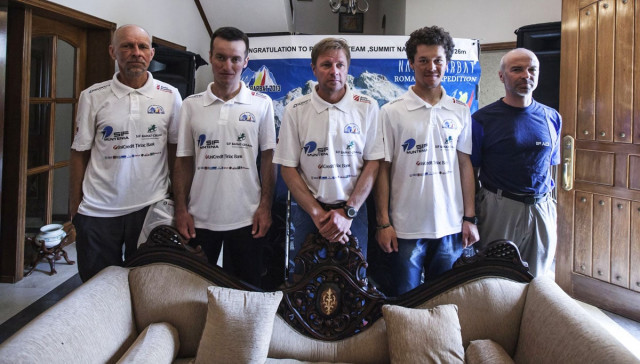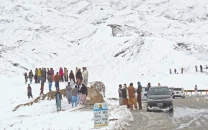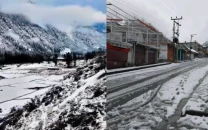These Romanians beat Pakistan's killer mountain, terrorists
Romanian climbers say they escaped the terrorists since they took a different climbing route.

Romanian climbers (L-R) Bruno Adamcsek, Teo Vlad, Zsolt Torok, Aurel Salasan and Marius Gane pose for a photograph after a news conference at the Romanian Embassay in Islamabad. PHOTO: RUETERS
"I called my wife (on a satellite phone) and she said the Taliban came and killed everyone in the base camp," he said. "I was shocked. We survived only because we'd chosen a different route."
Undaunted, Torok and four other Romanian climbers carried on with their ascent, becoming the first expedition to scale Pakistan's Nanga Parbat last week since the bloodiest attack on foreigners in Pakistan in a decade.
The Pakistani Taliban claimed responsibility for the pre-dawn massacre on June 22 when gunmen dressed as policemen stormed the 4,200-metre (13,860-foot) base camp, killing at least 10 foreign climbers and a Pakistani guide.
Victims included mountaineers from China, Lithuania, Nepal, Slovakia, Ukraine and one person with joint US-Chinese citizenship. One Chinese climber escaped.
Several expeditions to Nanga Parbat - at 8,126 metres (26,660 feet), the world's ninth highest peak and known among climbers as the Killer Mountain - have since been cancelled, dealing a blow to Pakistan's once thriving mountaineering sector at the height of the trekking season.
Torok, 40, and his team, passing though Islamabad on their way home after bagging the mountain on July 19, said they were unnerved by the attack but felt safe in the company of 10 armed Pakistani guards protecting their camp.
"Those climbers were innocent people," Torok told Reuters at the Romanian ambassador's residence in Islamabad. "Clearly those terrorists had prepared well. They wanted to shock everyone."
Years of violence
Like many other mountains in Pakistan, Nanga Parbat, with its icy slopes and treacherous crevices, is notoriously difficult to climb, making the country all the more attractive for the world's booming extreme sports industry.
Pakistan rivals Nepal for the number of peaks over 7,000 metres. It is home to the world's second tallest mountain, K2, and four, including Nanga Parbat, of the world's 14 summits higher than 8,000 metres.
But the potentially lucrative industry has been blighted by years of violence. The number of expeditions has dwindled, wrecking communities dependant on climbing for income and starving Pakistan's suffering economy of much-needed dollars.
The last time its tourist industry thrived was in the 1970s when Pakistan was famed as an exotic stop-off point on the hippie trail for Westerners travelling across Eurasia.
The Soviet invasion of Afghanistan and the ensuing turmoil in Central and South Asia brought the golden years to an abrupt end, and Pakistan's tourism sector has never recovered.
The Romanians had chosen to scale Nanga Parbat from the risky Rupal Face, a 4,500 metre (14,800-foot) vertical wall of stone and ice lashed by freezing winds from all sides. The Taliban attack occurred on the mountain's other side.
Torok said he hoped their experience would encourage other climbers to come back to Pakistan's Hindu Kush, Karakoram and western Himalayan ranges dotted by many unexplored summits.
"We didn't want to quit," said Torok. "Not even for a moment."


















COMMENTS
Comments are moderated and generally will be posted if they are on-topic and not abusive.
For more information, please see our Comments FAQ